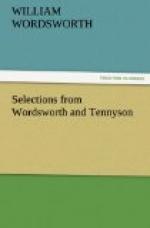NUTTING
COMPOSED 1799; PUBLISHED 1800.
“Written in Germany; intended as a part of a poem on my own life, but struck out as not being wanted there. Like most of my schoolfellows, I was an impassioned Nutter. For this pleasure, the Vale of Esthwaite, abounding in coppice wood, furnished a very wide range. These verses arose out of the remembrance of feelings I had often had when a boy, and particularly in the extensive woods that still stretch from the side of Esthwaite Lake towards Graythwaite.”
Wordsworth possessed in an unusual degree the power of reviving the impressions of his youth. Few autobiographical records are so vivid in this respect as his Prelude. In his famous ode on the Intimations of Immortality from Recollections of Early Childhood, he dwells upon the unreflective exultation which in the child responds to the joyousness of nature, and with a profound intuition that may not be justified in the facts, he sees in this heedless delight a mystical intimation of immortality.
In the poem Nutting the animal exhilaration of boyhood is finely blended with this deeper feeling of mystery. The boy exultingly penetrates into one of those woodland retreats where nature seems to be holding communion with herself. For some moments he is subdued by the beauty of the place, and lying among the flowers he hears with ecstasy the murmur of the stream. Then the spirit of ravage peculiar to boyhood comes over him, and he rudely mars the beauty of the spot:
“And the shady nook
Of hazels, and the green and mossy bower,
Deformed and sullied, patiently gave up
Their quiet being:”
Such wantonness seems to his maturer reflection a sacrilege, and even the boy was not insensible to the silent reproach of the “intruding sky.”
TOUCH,—FOR THERE IS A SPIRIT IN THE WOODS. Many lines might be quoted from Wordsworth to illustrate his theory of the personal attributes of nature. In some of his more elevated passages nature in all her processes is regarded as the intimate revelation of the Godhead, the radiant garment in which the Deity clothes Himself that our senses may apprehend Him. Thus, when we touch a tree or a flower we may be said to touch God himself. In this way the beauty and power of nature become sacred for Wordsworth, and inspired his verse at times with a solemn dignity to which other poets have rarely attained.
The immanence of God in nature, and yet His superiority to His own revelation of Himself is beautifully expressed in some of the later verses of Hart Leap Well:
“The Being, that is in the clouds
and air,
That is in the green leaves among the
groves,
Maintains a deep and reverential care
For the unoffending creatures whom he
loves.”
Yet the life in nature is capable of multiplying itself infinitely, and each of her manifold divisions possesses a distinctive mood; one might almost say a separate life of its own. It is, in his ability to capture the true emotional mood which clings to some beautiful object or scene in nature, and which that object or scene may truly be said to inspire, that Wordsworth’s power lies.




